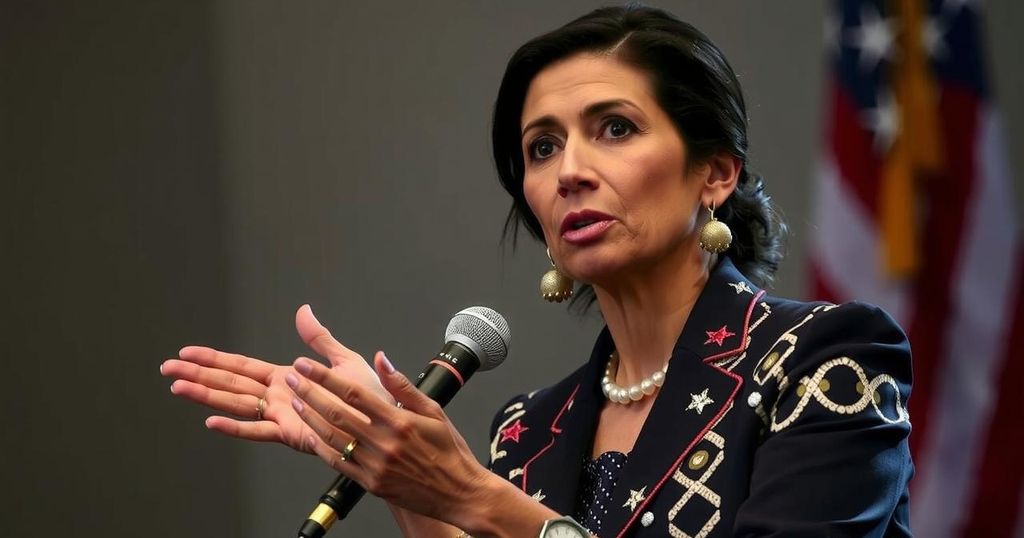Tulsi Gabbard’s DNI Nomination Sparks Controversy Over Syria and Russia Positions

Former Congresswoman Tulsi Gabbard’s nomination to lead U.S. intelligence agencies raises concerns due to her controversial past positions on Russia and Syria. Critics argue that her anti-war beliefs and interactions with Assad could undermine critical alliances and intelligence cooperation. Supporters tout her commitment to a peace-oriented foreign policy, but her Senate confirmation is expected to elicit significant debate from both political parties.
Former congresswoman Tulsi Gabbard is facing renewed scrutiny due to her controversial positions regarding Syria and Russia following her selection by President-elect Donald Trump to lead the U.S. intelligence agencies as Director of National Intelligence (DNI). Critics, including former national security officials, express concerns regarding her anti-war stance and her historic meeting with Syrian leader Bashar al-Assad. They argue that her views may hinder intelligence cooperation with U.S. allies, as evidenced by past statements that have raised doubts about U.S. assessments of Assad’s Syrian regime. While Gabbard contends that her position reflects a commitment to peace, her critics believe her previous comments could jeopardize the trust necessary for effective international intelligence sharing.
If confirmed, Gabbard would oversee the operations of 18 U.S. intelligence agencies, a crucial role requiring delicate diplomacy and robust integrity. Her past interactions, especially the 2017 trip to Syria, which she characterized as a “fact-finding mission,” have been cited as causes for concern, particularly after she publicly questioned intelligence claims regarding chemical attacks attributed to Assad’s government. Additionally, during Russia’s invasion of Ukraine, Gabbard’s statements were perceived by some as echoing Moscow’s rationale for aggression, thus provoking backlash from prominent political figures.
Gabbard’s views, while resonating with a portion of the electorate who favors non-interventionist foreign policy, have increasingly attracted criticism from both sides of the political spectrum. With key endorsements and opposition coalescing around her nomination, the Senate confirmation process is expected to be contentious. High-profile figures from both Republican and Democratic backgrounds have expressed reservations, warning that her appointment could compromise the United States’ intelligence relations with allies, particularly regarding challenging global dynamics involving Russia and Syria.
Tulsi Gabbard’s political journey has been marked by her pronounced anti-war stance and a willingness to engage with controversial figures, such as Bashar al-Assad. Her noteworthy ‘fact-finding’ trip to Syria in 2017, where she met Assad, along with her critical views on U.S. military interventions, has positioned her uniquely within political spheres, earning her both staunch followers and fervent detractors. The political landscape surrounding international intelligence and security is intricate, particularly in light of ongoing tensions between the U.S. and nations like Russia and Syria. Gabbard’s potential role as DNI comes at a time when trust and collaboration with U.S. allies are vital, making her past interactions and comments especially pertinent to her confirmation process. As President-elect Trump supports her nomination, questions remain about how her worldview will align with the operational expectations of U.S. intelligence.
The scrutiny surrounding Gabbard’s nomination as Director of National Intelligence underscores the complexities of U.S. foreign policy and intelligence dynamics. Her previous statements and actions reflect a non-traditional approach that could challenge prevailing narratives within the intelligence community. As Gabbard advances through the Senate confirmation process, the interplay between her anti-war ideology and the critical need for cooperative international intelligence sharing will be pivotal in shaping perceptions of her suitability for this high-ranking position.
Original Source: www.bbc.com







